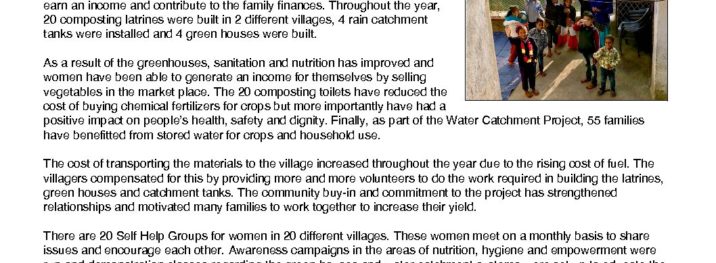Village Life Improvement Projects
Code:
IND-MUS-EMP-P01
Country:
IndiaCause:
Water & SanitationPopulation:
1.424 billionHuman Dev Index:
#132 (Aus #5)Jan 19
Overview
This is a pilot project focusing on three key aspects contributing to poverty in remote villages in northern India; lack of access to clean water, lack of sanitation facilities, and lack of food. Our partner is planning to build two water systems in two villages to provide easy and quick access to clean water for these villages. In four other villages he will work with the village women to construct green houses to grow vegetables. The vegetables will both improve nutrition (a major issue in this area) and provide for cash crops by selling to the nearest big town. Finally, with the villagers, 20 latrines will be constructed in four villages and the villagers will be given sanitation and hygiene training. Our partner has ambitious plans, working in 20 villages in this remote area. However, wisdom has dictated a small start to see how the projects are embraced by the local communities and to learn from the pilots what needs to change as the projects roll out.
Why support this
We love that this pilot project is targeting the keys to breaking poverty in this area. We also really appreciate the wise way each pilot village has been chosen. By choosing villages where success is most guaranteed, our partner is building enthusiasm for other villages to participate. We also really value the holistic nature of our partner’s approach, working on interlinked issues which when solved together, provide the greatest chance for breaking intergenerational poverty.
Budget
This budget will cover the cost of 20 latrines, two water systems and four green-houses as well as seeds and modest salaries for the workers undertaking the project management (a lot of the work will be undertaken by the villagers themselves).
Objectives Include
- This is an extremely poor part of India.
- Often, the men of the villages are away in larger towns trying to earn an income to send home.
- There are no toilets or taps, and electricity is also rare.
- Women work hard in the fields and then have to travel long distances to collect drinking water.
- Changing weather patterns means that crop yields are reduced, therefore malnutrition is a major problem.
- The lack of sanitation and clean water means health is poor for everyone, but particularly for pregnant women and infants.
Expected Life Change
- Improved diet leads to less malnutrition and greater energy to earn an income.
- Less time spent collecting water increases opportunities to undertake other income generating activities, or even just to draw breath.
- Reduced risk of injury to women at night and improved health of the entire village through access to latrines.

